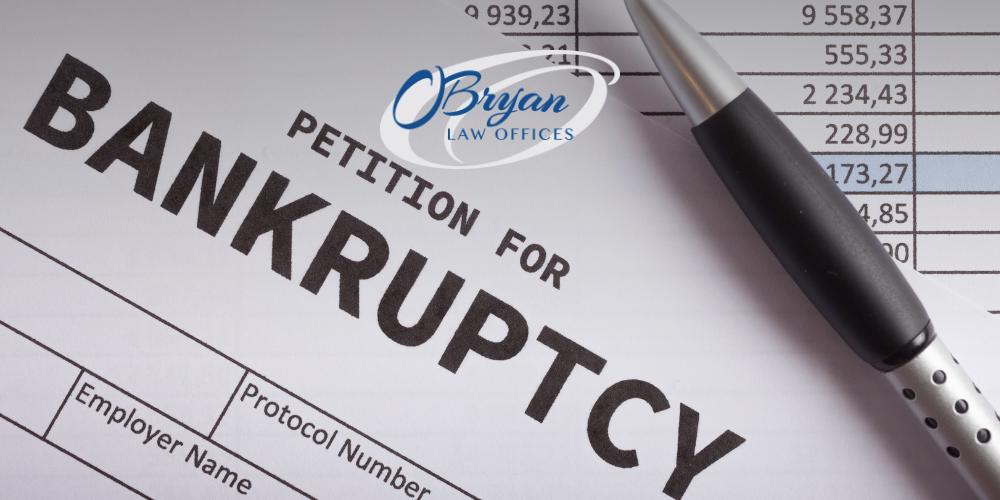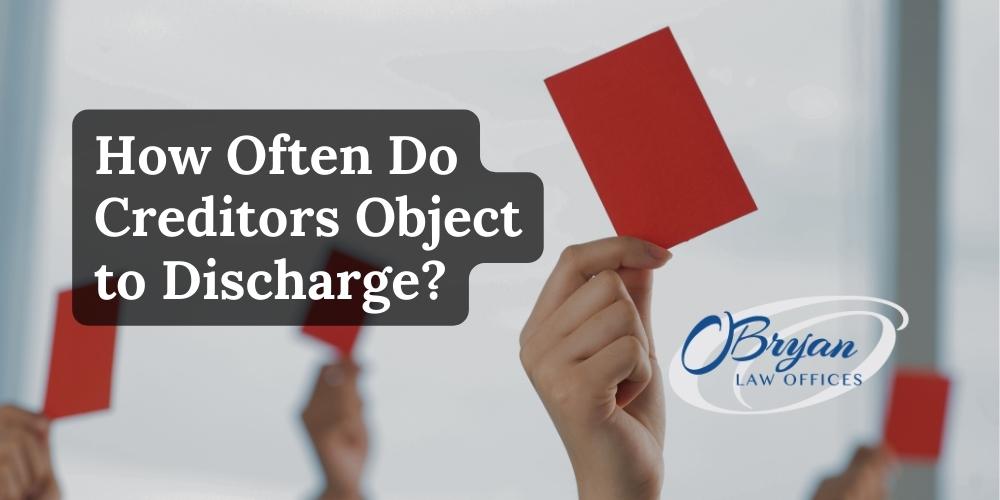In most Chapter 7 and Chapter 13 bankruptcy cases, creditors do not object to a discharge. Objections are relatively rare and typically arise only in cases involving suspected fraud, false financial disclosures, or abuse of the bankruptcy system. Under the U.S. Bankruptcy Code (11 U.S.C. §§ 523 and 727), a creditor has the right to challenge the discharge of certain debts if they believe the debtor acted in bad faith — but they must do so within a limited timeframe, usually 60 days after the creditors’ meeting.
If a creditor objects to your discharge, it can delay or even block the relief you’re seeking. That’s why it’s critical to work with an experienced Louisville bankruptcy attorney who understands the laws and local court procedures.
Call O’Bryan Law Offices today at (502) 339-0222 to schedule a free consultation.
What Is an Objection to Discharge in a Bankruptcy Filing?
A bankruptcy discharge releases a debtor from their dischargeable debts after a bankruptcy filing. Depending on which chapter of the bankruptcy code the debtor filed under, they will only be able to receive their discharge order after a certain amount of time. For example, someone who files for a Chapter 7 bankruptcy will most likely receive their discharge 4 months after filing. In contrast, someone who files for a Chapter 13 bankruptcy may only be discharged 3-5 years after filing bankruptcy.
After receiving a discharge order, the bankruptcy trustee handling the case will notify all creditors, stating that they are legally required to cease collections on the debts owed to them by that debtor. While most creditors will abide by this, some may file an objection to the discharge, which can lead to additional legal action in a given bankruptcy case.
What Happens If a Creditor Objects to Discharge?
If a creditor believes that a particular debt should not be discharged, they can file a formal objection with the bankruptcy court. This objection typically claims that the debt was incurred through fraud, false representation, or other misconduct outlined in 11 U.S.C. § 523 or § 727. If the court accepts the objection, that specific debt becomes non-dischargeable, meaning you’ll still be legally required to repay it.
To initiate the process, the creditor must file a lawsuit called an adversary proceeding within 60 days of the first scheduled meeting of creditors (also known as the 341 meeting). This deadline is strictly enforced. The adversary proceeding opens a contested matter within your bankruptcy case, where the creditor must present evidence and make a legal argument as to why the debt should not be discharged.
Once filed, the case proceeds like a civil lawsuit, with both sides given the chance to exchange information, submit evidence, and attend hearings. If the creditor fails to file within the deadline or cannot prove their case, the debt will typically remain discharged. Working with a bankruptcy attorney can ensure that all timelines are met and your rights are fully protected throughout the process.
What Types of Debts Cannot Be Discharged in Bankruptcy?
While a successful bankruptcy discharge eliminates many debts, certain obligations are excluded by law—either automatically or if a creditor successfully objects under 11 U.S.C. § 523. These nondischargeable debts remain legally enforceable and must still be repaid, even after your case is closed.
In Kentucky, the following debts are generally not dischargeable through Chapter 7 or Chapter 13 bankruptcy:
- Child support and spousal maintenance (domestic support obligations)
- Recent income taxes or tax debts tied to fraud
- Student loans, except in rare hardship cases
- Fines, penalties, and restitution owed to government entities
- Debts from personal injury or death caused by drunk driving
- Court fees or criminal restitution
- Debts from fraud, false representation, or intentional misstatements
- Debts incurred through embezzlement, larceny, or fiduciary fraud
- Luxury purchases or cash advances made shortly before filing
- Debts from willful or malicious injury to another person or property
- Certain homeowners’ association fees
- Debts previously discharged in a recent bankruptcy filing
Creditors can also object to the discharge of other debts they believe fall into these categories. If successful, you’ll remain liable for repayment.
Why Might a Creditor File an Objection to Discharge?

A creditor may object to discharge when they believe the debtor acted in bad faith or violated specific provisions of the U.S. Bankruptcy Code. Some objections target individual debts, making them non-dischargeable. Others aim to deny the entire bankruptcy discharge, meaning none of the filer’s debts would be wiped out. These objections are typically based on fraud, dishonesty, or procedural violations under 11 U.S.C. § 523 or § 727(a).
They Suspect You Committed Bankruptcy Fraud
Many objections are based on allegations of fraud. This may include:
- Concealing property or assets from the bankruptcy estate
- Lying on bankruptcy schedules or under oath
- Falsifying financial records or paperwork
- Running up debts—such as luxury purchases or cash advances—shortly before filing with no intention to repay
If a creditor proves any of the above, the court may find that specific debts are non-dischargeable.
There Was Intentional Damage or Misconduct
Creditors may also object if the debtor intentionally damaged property, committed fraud while acting in a fiduciary role, or caused willful and malicious injury to another party. For instance, vandalizing a repossessed home or defaulting on loans obtained through deceit could justify denying discharge of those debts.
Broader Grounds for Denial of Entire Discharge
Under § 727(a), creditors—or the trustee—can also request denial of all discharge protections based on broader misconduct, including:
- Fraudulent transfers or concealment of assets within one year of filing
- False statements or perjury during the case
- Failure to maintain or produce financial records
- Refusing to obey court orders
- Receiving a prior discharge in too short a time frame
These cases go beyond individual debts and could leave the debtor responsible for all outstanding obligations.
Some Debts Fall Into a Gray Area
Some creditors may not file an objection to a specific debt, but there may be a need for further clarification regarding the dischargeable and non-dischargeable debts in a given case. Most priority debts, like child support, court costs, and governmental loans, cannot be discharged. However, in certain circumstances, they may be made dischargeable.
In these cases, creditors may request the court weigh in on the decision to discharge these debts. Additionally, things like tax debt can make the bankruptcy process more complicated and can lead to disputes on whether or not it should be discharged.
How Will I Know If a Creditor Objects to Discharge in My Bankruptcy Case?

If a creditor decides to file an objection to your discharge, you’ll receive notice of an “adversary proceeding” from the court that handled your bankruptcy case.
What Is an Adversary Proceeding in Bankruptcy Court?
In bankruptcy court, an adversary proceeding is like a lawsuit that the creditor files against the debtor. The creditor is disputing the debtor’s discharge, and the judge is acting as a neutral third party helping to resolve the issue. In the proceeding, the creditor must prove to the court that some form of fraud, intentional damage, or error occurred in the process, or that they should otherwise reverse their decision to discharge a certain debt.
What Can I Do If a Creditor Objects to My Bankruptcy Discharge?
If a creditor files a formal complaint objecting to your discharge, you’ll be notified through a legal action known as an adversary proceeding. This is essentially a lawsuit within the bankruptcy case, and the creditor must present evidence that supports their objection—usually involving fraud, concealment, or bad faith.
If the court rules in favor of the creditor, you may remain liable for the disputed debt. However, not all objections lead to trial. Many can be resolved through settlement negotiations, where both parties agree on how the debt will be handled without prolonged litigation.
- Hire experienced legal counsel: Bankruptcy law is complex, and even a small misstep can jeopardize your discharge. A lawyer can protect your rights and respond effectively to objections.
- Review your bankruptcy petition and financial records: Ensure your documentation is accurate and complete. Your attorney may need supporting records like bank statements, tax returns, or loan agreements to defend your case.
- Respond promptly to the objection: Deadlines in adversary proceedings are strict. Failing to respond on time can result in a default judgment against you.
- Consider settlement: In some cases, it’s more practical to negotiate with the creditor to resolve the objection without going to court, saving time, stress, and legal expenses.
Can a Discharge Be Revoked?
Yes. While most objections target specific debts, it is possible for a creditor—or the bankruptcy trustee—to request that your entire discharge be revoked. This usually happens when the discharge was obtained through fraud, concealment of assets, or a violation of bankruptcy rules after the case was filed.
For example, if a debtor receives a discharge and it’s later discovered they failed to disclose a valuable asset or lied under oath, the court can revoke the discharge under 11 U.S.C. § 727(d). That means all previously discharged debts could become collectible again.
If you’re facing an objection or are concerned about potential revocation, contact O’Bryan Law Offices at (502) 339-0222 for immediate legal support.
Contact a Kentucky Bankruptcy Lawyer at O’Bryan Law Offices Today
Filing for bankruptcy can be a complicated process, and if you have a creditor file an objection to your bankruptcy discharge, the process can become even more complicated. The bankruptcy lawyers at O’Bryan Law Offices can help you navigate the bankruptcy system and can handle your bankruptcy case from start to finish. Call us at (502) 339-0222 or contact us online to schedule a free initial consultation with an experienced attorney on our team.
Frequently Asked Questions
Creditors must file any objections to a debtor’s discharge within 60 days after the first meeting of creditors (the 341 meeting). Missing this deadline typically means the objection cannot be considered, and the discharge will be granted as planned.
Yes, but it’s not very common. Most Chapter 7 cases proceed without objection. However, creditors may choose to challenge the order of discharge in Chapter 7 if they believe the debtor acted in bad faith—such as by committing fraud, misrepresenting income or assets, or taking out large debts shortly before filing for Chapter 7 bankruptcy.
These objections are typically filed through an adversary proceeding and must be supported by evidence. While rare, they can delay or prevent the discharge of certain debts or, in severe cases, the entire bankruptcy discharge.
Creditors may object during a Chapter 7 case if they believe the debtor engaged in fraudulent behavior or misconduct that should prevent the granting of an order of discharge in Chapter 7. Common reasons include hiding assets, making false statements, or accumulating debts through luxury purchases or cash advances just before filing for Chapter 7 bankruptcy without any intent to repay. These objections aim to protect creditors from losing repayment on debts that should not be wiped out and ensure the bankruptcy process is fair and transparent.
A bankruptcy discharge releases the debtor from personal liability for most debts, preventing creditors from collecting on them. However, certain debts are excluded by law and remain payable. The discharge serves as a legal injunction stopping collection actions on discharged debts.
It is a formal document filed by a creditor challenging the discharge of one or more debts in bankruptcy court. This notice triggers an adversary proceeding, where the court reviews the objection and decides whether to deny discharge of the specific debts or the entire bankruptcy.



